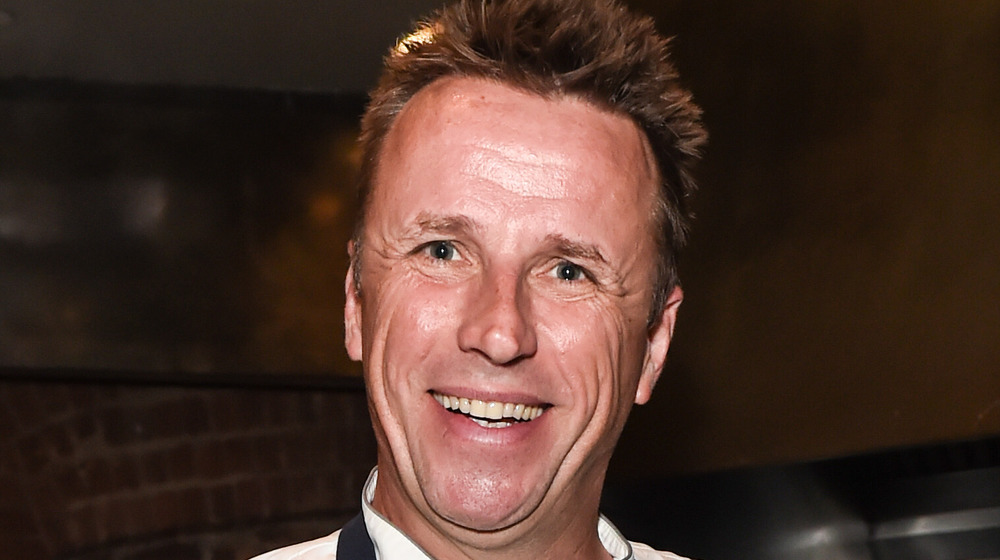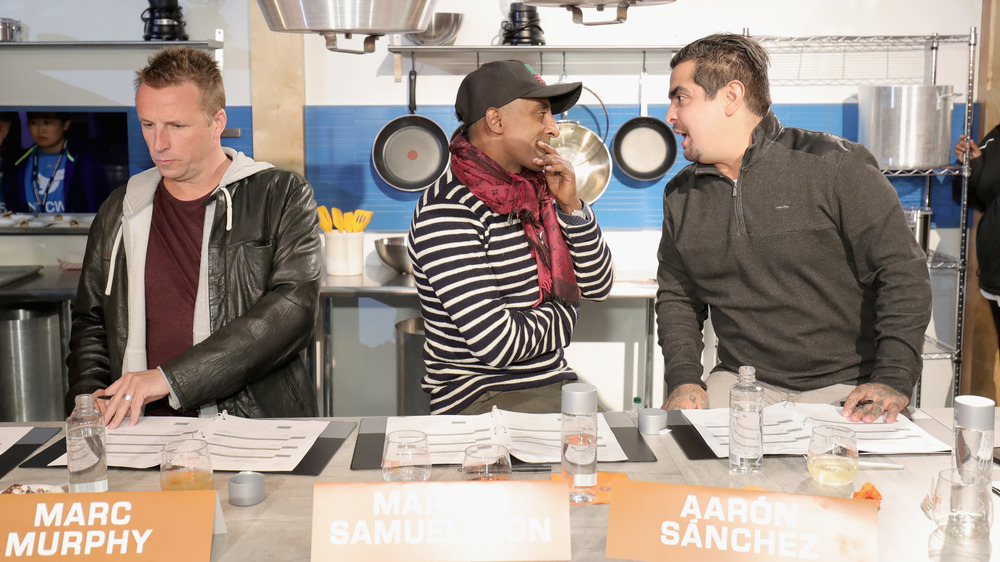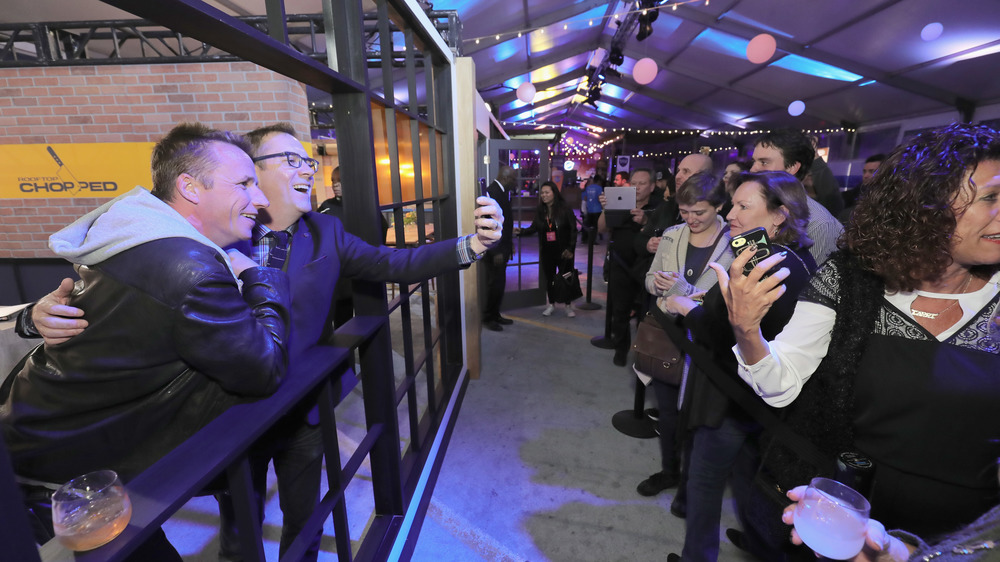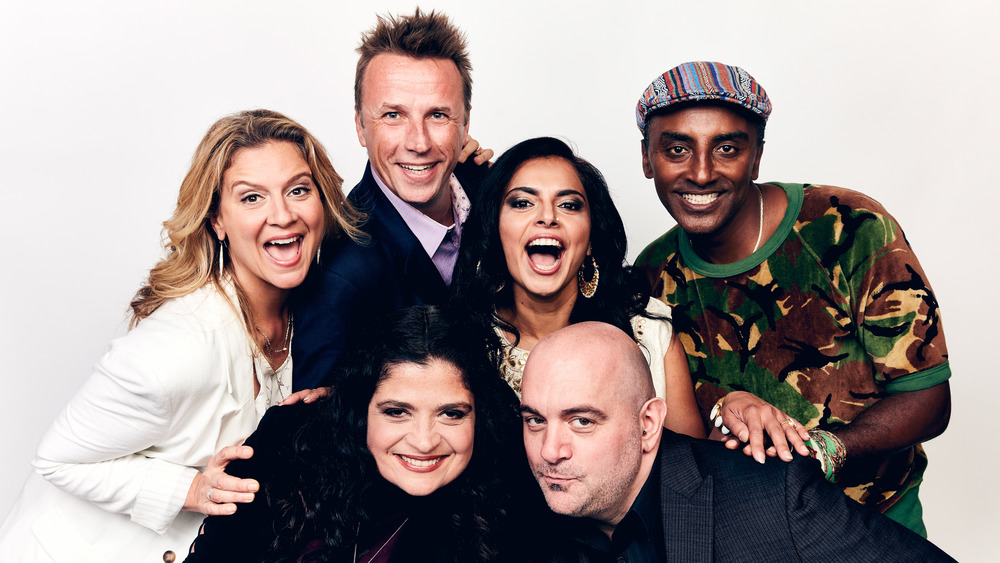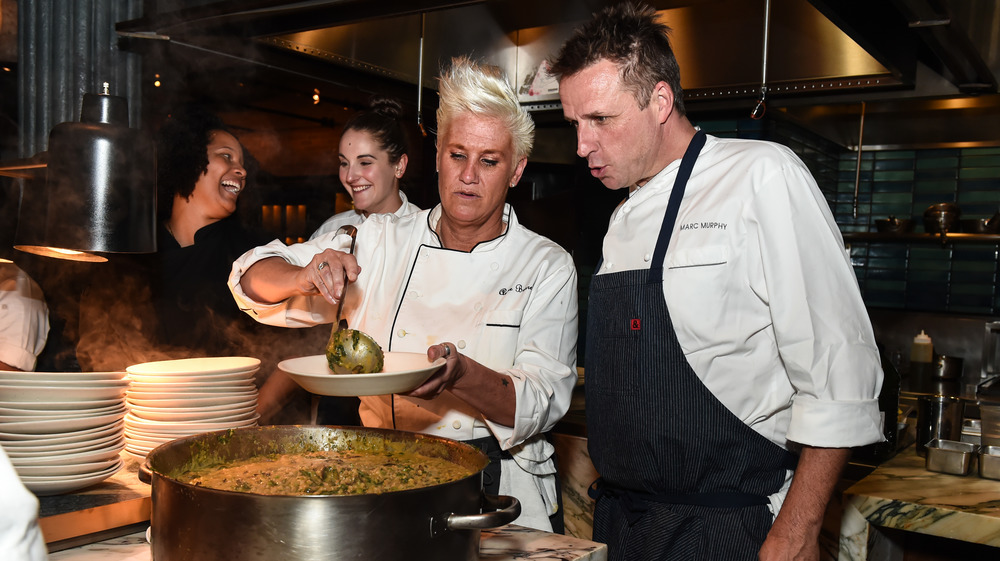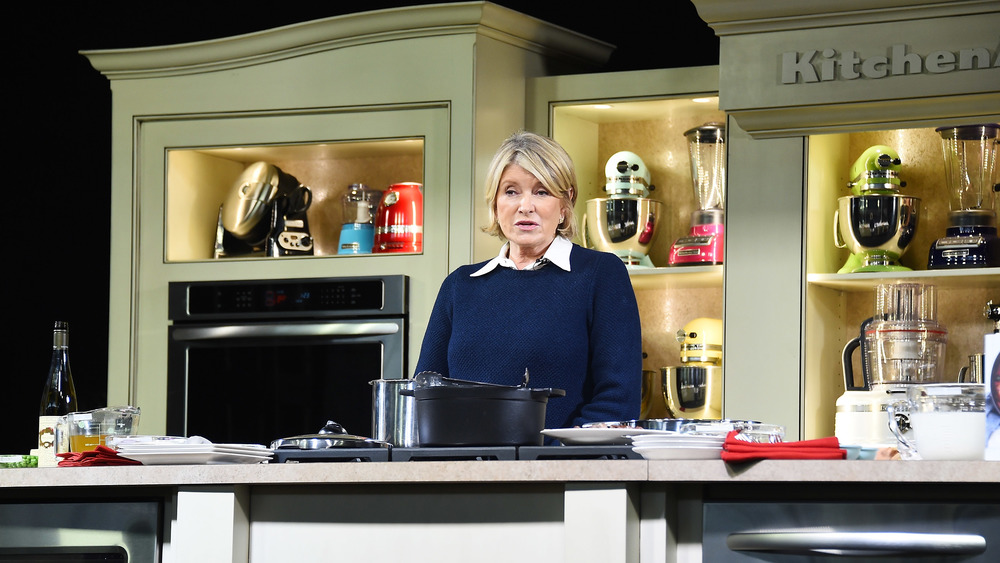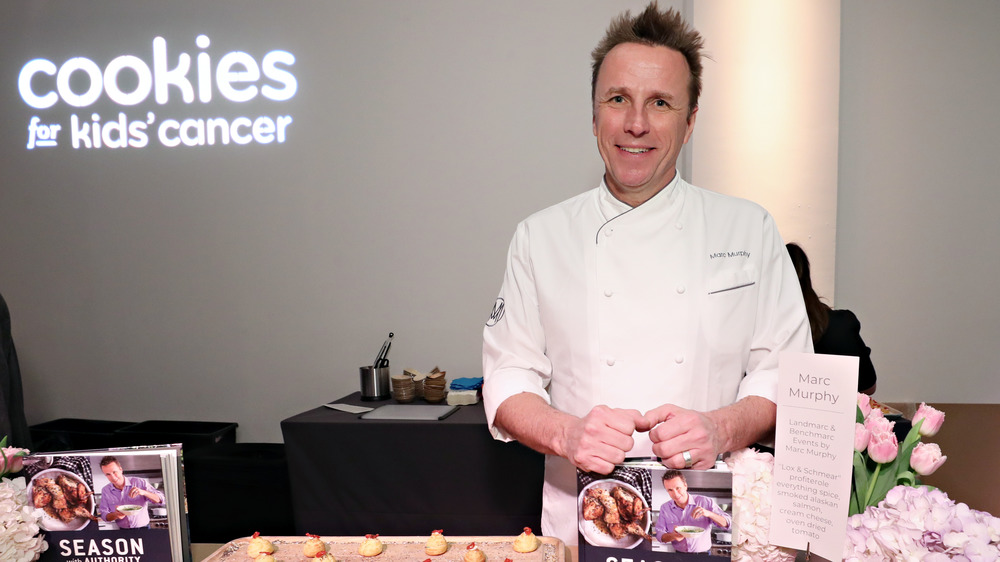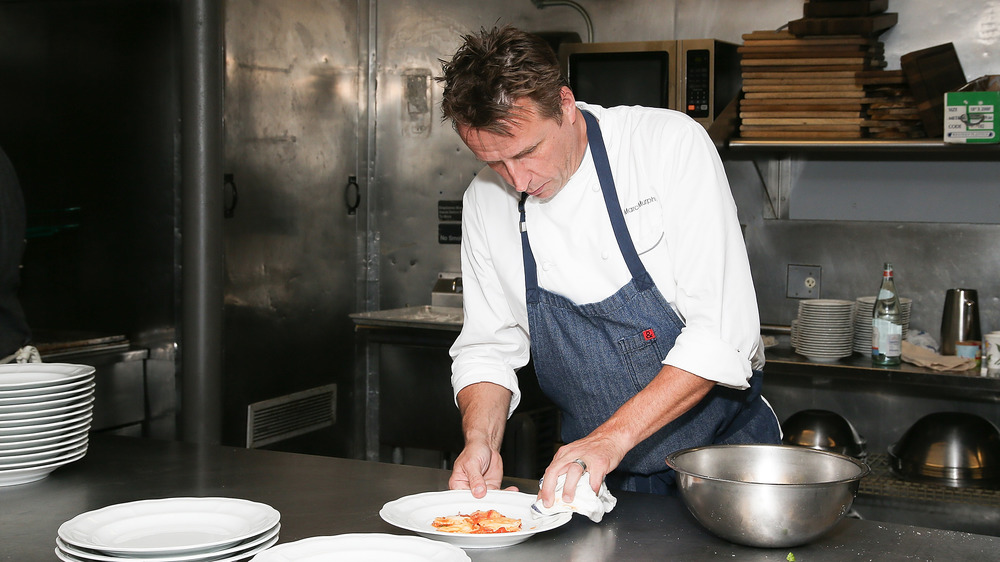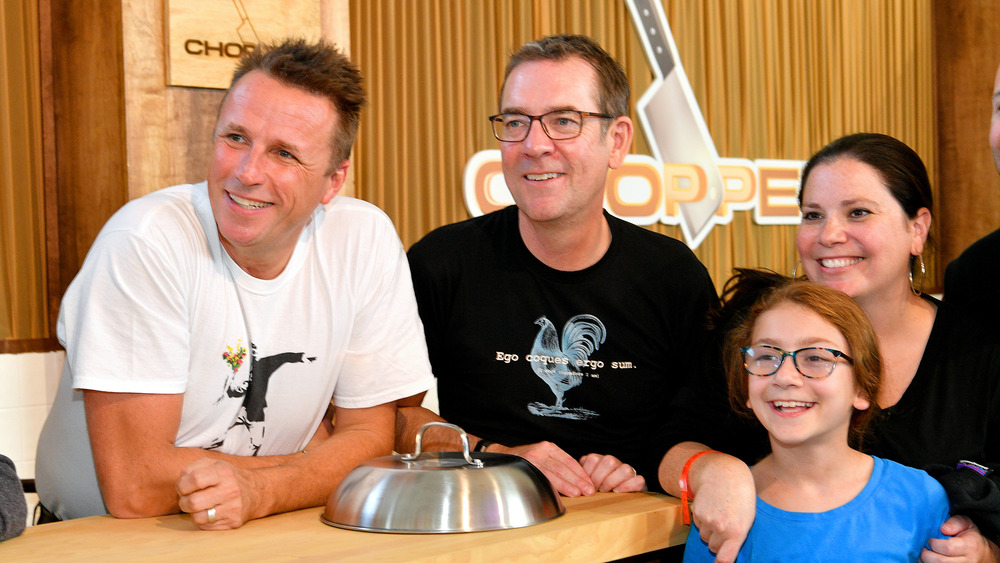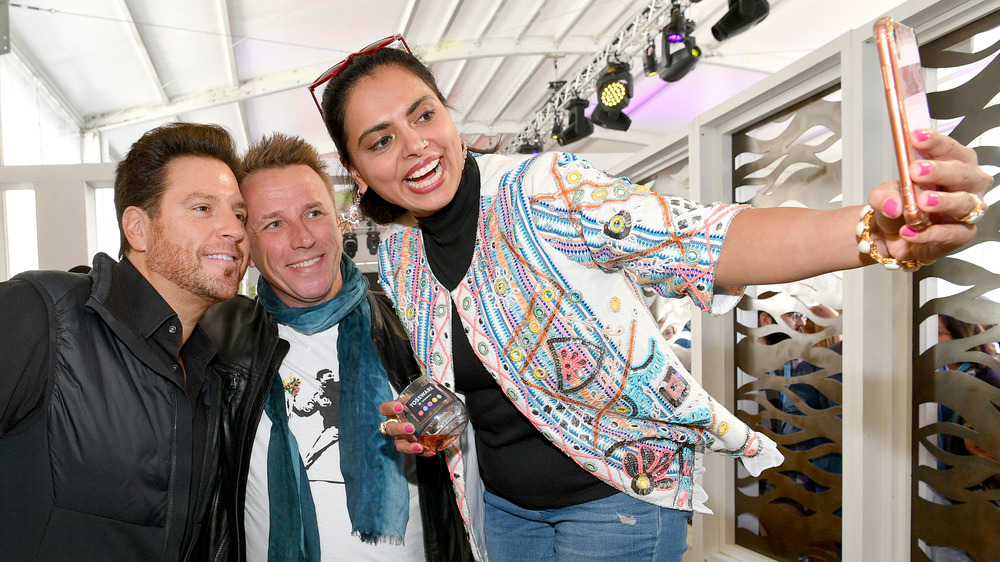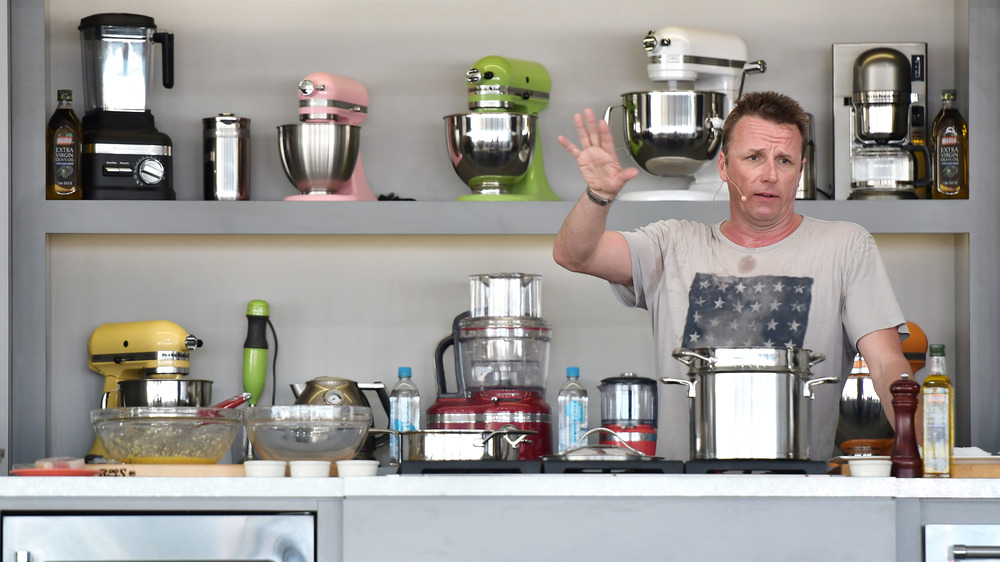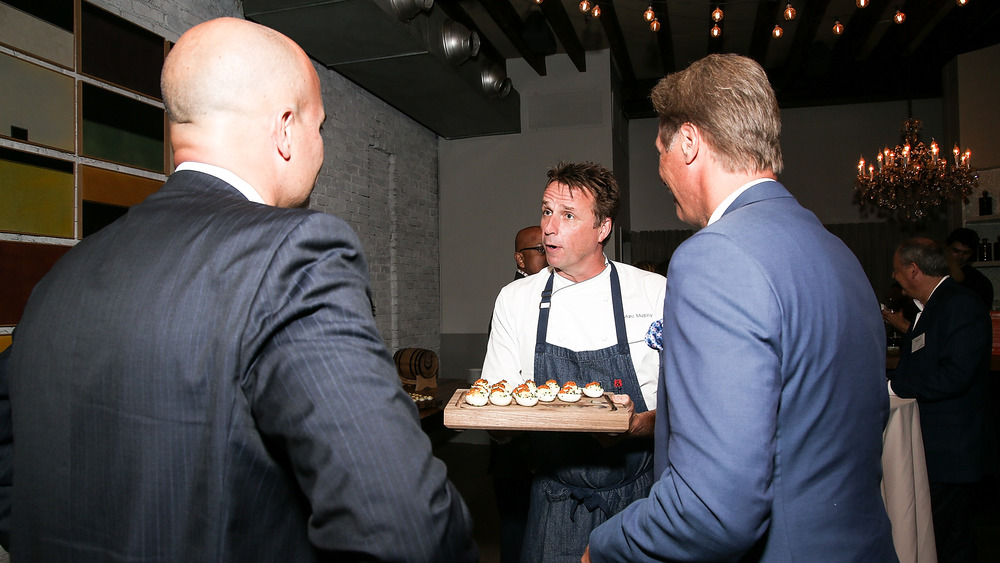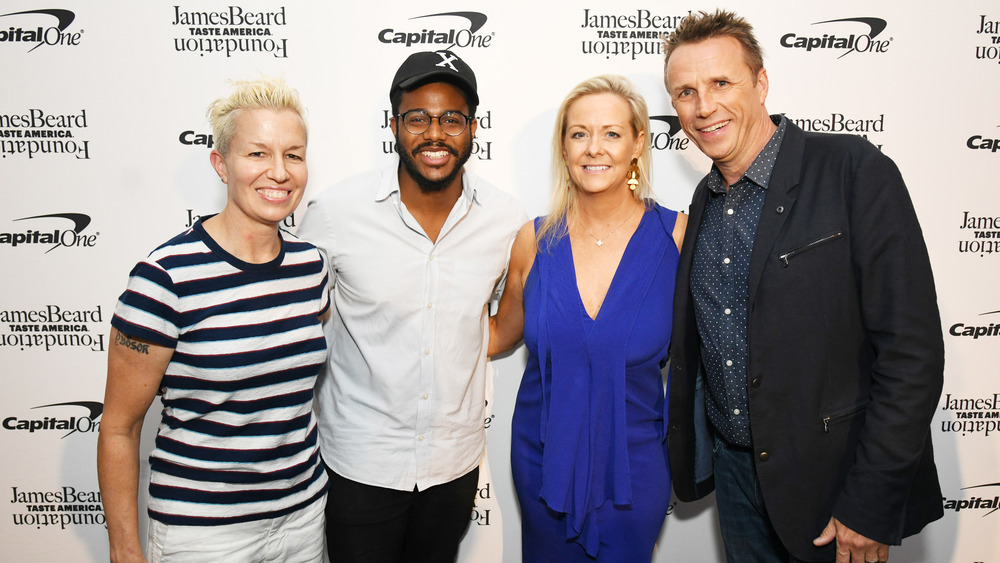Marc Murphy Talks Chopped And How A Dyslexia Diagnosis Changed His Life - Exclusive Interview
Chef Marc Murphy might be best known as a long-running judge on the popular culinary competition show Chopped. As one of five tastemakers on the Chopping Block, Murphy is passionate about the world of food. Murphy first gained notoriety as a chef. Growing up the son of a diplomat, the cuisine of Rome, Paris, Milan, and Washington D.C. shaped his palate. Moving from odd jobs to the Institute of Culinary Education, Marc discovered a knack for navigating the high-pressure of a kitchen.
He opened his first restaurant in New York with wife Pamela Schein Murphy in 2004. The 300-seat Landmarc bistro lasted for 12 years. Murphy ultimately opened four properties as the owner of Benchmarc Restaurants after joining the Food Network during its infancy. He's now a regular appearing on shows including Guy's Grocery Games, Beat Bobby Flay, and Worst Cooks in America. And, he isn't slowing down.
Murphy recently partnered with Braintrust Tutors, tutoring for children with learning disabilities, to share how differences can be an asset in the classroom and the kitchen. He attributes his challenges with dyslexia as what drove him to be a chef. Not bad for someone who wrote the cookbook Season With Authority: Confident Home Cooking and joined the U.S. Department of State's Diplomatic Culinary Partnership.
Mashed spoke with Murphy about Martha Stewart, the best and worst parts of judging, how he stays inspired in the kitchen, what viewers don't see on Chopped, and more.
Marc Murphy learns right along with the Chopped audience
Our readers love Chopped, and we'd love to know what it's like to be a judge.
First of all, for me, it's just been such a great show. You think of competition shows on the Food Network as being competition shows on the Food Network. But, I feel like we do a really good job at a couple of things. We entertain people, which is great. I think we also teach people as we're entertaining. I think that we, ourselves as judges, get schooled. We learn about ingredients that we might not know enough about. Sometimes, you get some great information from the contestants about ingredients that they know more about than we do. As judges, we don't claim to know everything about everything. So, there's always space for us to learn.
In turn, the audience learns about ingredients. They learn about how to manipulate them, and how flavor profiles can blend. So, I love that aspect of the show that we're, one, entertaining, but we're also tricking people into learning something new, as well. But the other great thing about the show is the inspiring sort of message here. Yes, of course, four people show up, one person walks away a winner, and three people have to lose. That's the way it works, unfortunately. That's competition. What is great is to really hear these people's stories and where they've come from. I feel like some of these people, cooking has saved their lives. We have great stories about people having been in gangs, and moving to another coast, and getting a job as a dishwasher, and working their way up as a sous chef, and a chef.
Chefs, cooking, the world of restaurants, the world of food — it's a beautiful place. If you're going to be in the food industry, like most or all these contestants are, you have to have a heart because your job is feeding people. If you're feeding people, you're probably a good person. It's hard not to be, right? So, that's the third great aspect of the show.
Judges spend more time with Chopped contestants you think
Is there anything behind the scenes [on Chopped] that you wish the viewers could see?
The one thing that I feel [we miss] is that the audience doesn't see more of these stories about these contestants. Some are truly inspiring... We obviously get to sit there and talk to these people a lot longer while we're judging their food, and some of those stories are just beautiful. I do wish that we could get more of the behind the scenes out there for the audience to see.
We just did an episode a couple of weeks ago with "Hometown Heroes." There were four different nurses from different aspects of the nursing community to celebrate nurses during this time, and what healthcare workers have done for our society and our communities. I mean, we had the box of Kleenex under the table, let me tell you. The one woman who was a nurse who went off to work, and her 9-year-old son had to go live with her parents. The only way she would see her son was to drive by the house and look through the window. She had to look at him through the car window because while working in a hospital she couldn't physically see her son. Those stories tear me apart, as a father as well. You see that the extent these people went through, are still going through some of them, to take care of their community. That's just one little, tiny, tiny story of one person that was on Chopped. The emotional aspect of the show is pretty amazing. I get emotional just talking about it now. I get all choked up. That's the great thing about the show and yes, that's what I wish more people could see.
I also wish people could see, and I would like to know, where contestants are now. For example, the person who won the first episode of Chopped. It would be interesting to see. That was now 12 or 11 years ago, right? We've been doing this show for so long. But we're starting to feel old. We're like the cast of Friends really, we're going to be like [them] later on, after 20 years of doing this.
The show does change some people's lives. I mean, yes, it's not a terrible amount of money for a restaurant or culinary project. It's $10,000. It's nice for some people. It's great, but what really matters I think is the notoriety and the confidence. Being on the show gives some people physical confidence to move on with their career or the little seed money that they get. I would like to go back and see "where are they now," so to speak. And who knows? Maybe we'll get around to that at the Food Network. I will see if that can happen one day, but it would be great to see that. Some of us might've ended up in jail, but you never know.
Marc Murphy dishes on why being a Chopped judge isn't as easy as everyone thinks
It sounds like there are so many good parts of being a judge. What is one of the harder parts of being a judge on the show?
The hard part is, obviously, sending people home. I mean, it is truly difficult sometimes. You'll get different characters up there. You'll get a character where you're like, "Oh, this guy's really cocky," or, "This person's really kind of..." but they really cook well. We judge the food. We don't judge the character or the personality. Because we judge the food, well sometimes you send the nicest people home. They just didn't do well with the ingredient on the plate. So, that's always very, very difficult.
And the other aspect is obviously choking down some of these ingredients that they put in those baskets, and it's no fault of the contestants sometimes. But sometimes ingredients are hard to weave into a dish and stand out in an awkward way. We have to taste and try. It's like, "Ugh, okay, see how that goes."
One unexpected dish that taught Marc Murphy a new flavor combination
Speaking of food, do you have one memorable dish that you've tried that was either a fail or a favorite of yours?
We've seen a couple. Obviously, some fails just didn't work. I remember a piece of fish once that had cornmeal on it that hadn't really cooked well enough. It tasted like the fish had just been rolled around the sand. Ugh, and that wasn't very good. There's been many memorable dishes — there's been many.
I do talk about one where somebody put tarragon and leeks braised — I'd never heard of tarragon and leeks going together, but it worked really well. Sometimes there are sort of flavor profiles that sort of surprise us even. And then, we're like, "Oh, wait. I'm going to do that someday."
What are some of the biggest mistakes you've seen people make in the kitchen?
We did have somebody make a dessert once using salt instead of sugar. That didn't work out. It drives me crazy because you see people on that ice cream machine. They let it turn too long. They just turn it into butter. It's like, "Haven't you watched the show before? Come on." It takes six to seven minutes to turn an ice cream. Depending on if it goes in hot or cold that adjusts one minute more each way. That machine is a professional industrial machine that can turn a nice mixture into ice cream very quickly. So, gosh, darn it. Just look at the clock. Put your mind to it. Add five minutes to the clock and then go check your ice cream.
As a judge, we've been there long enough. I mean, we can hear that machine as soon as it starts getting too tight. Because what happens is it gets too cold and the machine just starts turning the mixture inside into butter basically. You can hear it start struggling. You're like, "Ugh, well, we're not going to have a good ice cream now. We're going to have some piece of butter on the plate. It's going to be terrible." That's always a sad mistake.
The other thing that is also surprising is we'll give people the whole crown roast, or we'll give them a whole ribeye, a big piece, and they try to cook it, like that. Yeah, that would be great if you have an hour and a half. But, you need to butcher it down. You need to cut a piece that's cookable and servable in 30 minutes, not a four-bone ribeye. Season it up nicely and sear it, and put it in the oven. I mean, you don't have an hour and a half. It's not going to cook. It's always interesting is that does become a sort of a trick that people fall into sometimes
That's interesting. Know your limits.
Know your limits of the ingredient. I mean, you're not going to make that now. There are certain things that you're just going to avoid. What always kills me is when people are making little raviolis or wontons, all that little, tiny, tiny, work. You're under so much pressure. How can you do this to yourself? You know how hard it is to make a little wonton, right? Folding the edges, getting the egg wash on there right. I'm like, "We're each going to get one wonton out of this." I can see it now.
Martha Stewart wowed judge Marc Murphy on the set of Chopped
Could you tell us a little bit about what viewers would expect to see on Chopped: Martha Rules?
We shot it a couple months ago up in Maine on a farm. One, it's going to be gorgeous. I mean, there's no doubt about it. The setting is beautiful. The weather was great, and it's Martha's rules. I don't want to give it away, but she [Martha Stewart]changes it up a bit for the contestants. She throws them all a little curve ball here and there, which was a lot of fun. She does everything, obviously, with so much grace and poise, which is beautiful. She's absolutely amazing to work with. I worked with her before on the set. In this setting, we filmed for a full week, five days on set. It's going to air over a month and airs one per week, but we shot all of the episodes in a full week.
The amount of knowledge that is in that woman's head is, you're just jealous. I mean, we're talking about the flowers in the field and she's like, "You don't know what that is?" No, I don't know what that is. What do I look like? But she knows everything about every flower. And she's very generous, very generous with her time, with her information, with what she knows. Marcus [Sammuelson] and I were the judges. We flanked her for this whole tournament. We basically left with a PhD of some sorts from all the information we got to learn. It was fun. She's a wonderful person and has a big heart for the things that she loves. Always seems to be trying to help other people along the way as well.
You'll never catch Marc Murphy without this one ingredient in his kitchen
I did want to ask if you have an ingredient or dish that is your go-to at home.
Dijon mustard. There's a couple of things that are in my kitchen, but Dijon mustard is one of those things that's always there. I use it for vinaigrettes. I'll throw it into beans that I'm making. I'll throw it into lentils. Actually, I learned something very interesting from Michael Voltaggio when I was doing a Guy's Ranch Kitchen once. He takes 50 percent Dijon mustard and 50 percent soy sauce and mixes it. It's a great condiment on a steak or a chicken. It's so interesting. I urge you to try it. It's really, really great. And Michael is obviously an amazing chef and always is thinking outside the box. I've sort of followed the rules a little more, but when I got introduced to that, I've introduced it to some friends of mine and they don't serve steak without that now. It's really interesting. It's great.
To follow up on that, do you have any other tips or secrets for people to stay inspired in the kitchen? A lot of us are in the kitchen a little more than maybe we'd like to be these days.
To me, it's about learning new things and experimenting. Don't just rest back on your laurels or rest back on all those ingredients. I love to see new things. I love to absorb new information. Sometimes it's just, I'll do it. My wife will go shopping sometimes, or she's going to cook dinner and she doesn't have time. She's the type of person who gets a recipe out of The New York Times. And I'm like, "Well, what were you going to make?" She hands me a piece of paper. Okay. I don't usually sit there and say, "stir three minutes." I don't do that part of the recipe. But I'll look at the recipe and go, "Oh, interesting." I mean, like marinating it in lime juice and cilantro. This isn't something I would normally make. It's not in my wheelhouse, but I love the challenge. And I love getting to know some new ingredients and new ways to do things. It's fun.
Also, I bought spices. I've convinced a couple of my friends too, about these guys from Burlap & Barrel. Have you seen this company? They're doing all these single-origin spices. They're really great. I went nuts and got the kit. They'll send you one of everything they have. And it's literally, it's in my closet, and it's these spices that I don't usually cook with. I just stand there and I'm like, "I'm going to use this somehow. I'm going to taste it now. I'm going to taste it, muddle through, and I'm going to try to develop a recipe around this spice." And it's fun to sort of find that. We're all getting a little bored here sometimes, cooking at home for so long. You got to spice it up a bit somehow. So, I'm literally spicing it up by using different spices.
The real reason Marc Murphy became a chef
You attribute your success as a restaurateur, at least in part, to having dyslexia. How has this different style of learning ultimately helped you as a chef?
When I was approached by Braintrust, an organization that is helping with tutoring and helping kids with dyslexia and learning disabilities, I jumped on the bandwagon immediately. I'm extremely dyslexic. I feel as though, look, we all have our own paths, right? Everybody's got their path. And I, as a child, was constantly in trouble. I was constantly doing the wrong thing. I was getting terrible grades. And I got to one point when I was in maybe fourth or fifth grade, they were like, "Hmm, something's wrong with this kid." Back then, they didn't really understand dyslexia... Another teacher at the school, he's like, "There's something different about your son." They finally realized that I had dyslexia.
Dyslexics, we learn in a different way. We don't go from traditional schooling that goes from point A to point B in a straight line. We might zigzag a little bit, but we get to that point. We just need to do it differently. And to me, being on Chopped and having mentioned it a few times, the amount of outpouring I get from, the emails from parents or social media hitting me up like, "Oh my god, you're dyslexic. It's so great. My son, you're such an inspiration. He loves Chopped, and he sees that one of the people that he loves is dyslexic."
So, the reason I say that I feel like I got into the restaurant industry is because of dyslexia. I couldn't get, I mean, I never could have gotten into college. I barely made it out of high school. I was constantly either getting kicked out or failing out of school. I was trouble because when you can't do well in school, you do other things to compensate. I went to a three-month cooking school where I just aced every test that was physical. Everything that was written, I did not do well on. But every time it was a physical thing, I was like, "no problem." I can build something. I can make something. I can put it on a plate. And it was great because for me, it was instant gratification as well, because it was like, "Oh my God, my work is done. And it is here. You have eaten it now. It's over with."
Turned out, I was pretty good at it. And it was the first time I was good at something or had somebody saying, "You did that well." I'm like, "What?"
If I hadn't [struggled with education], I might not have gone this path, right? Maybe I would have learned differently, and I might've become something else. So, I sort of accredit my having been so bad in school and being dyslexic. Maybe that's what drove me into a kitchen. I mean, I started cooking because I was hungry. I didn't want to be hungry. I realized that I was okay being homeless, probably, in my life. But, I definitely didn't want to be hungry. I thought cooking, if I could be good at that, I would be at least fed, which I was sort of happy about. I think that if I had been better off in school and done differently, I might not have headed down that path. That's where I say dyslexia might've helped me in my career path.
This is Marc Murphy's secret to success
Is there something that you would wish people knew more about cognitive diversity and different learning styles that can ultimately help people in the kitchen or in the classroom?
I think it's just a matter of everybody learning differently. In traditional education, we were supposed to be able to read by third grade. You're supposed to be able to do this by fourth grade. That's a bunch of bull. Everybody grows at a different rate for one, and everybody learns differently. And I think that schools and educators need to be able to be like, "Oh wait, we have to sort of bob and weave here because not every kid's made the same." And, of course, it's difficult. You've got a class of 20 and you got to have somewhat of a structure. I think people with learning disabilities have to realize it's not them. It's not their fault. It's the people teaching them who's fault it is because they're not understanding how to teach them in a certain sense.
But the other good thing out of the whole problem is, I actually had to give a commencement speech at a school back then that used to be just for dyslexic people. We are a much smarter group of people. Because dyslexics think in a different way, they can solve problems in different ways. I think, in the end, it makes people think differently and understand things differently, which I think is great. You go back and you look at the people that are dyslexic, there are some very, very famous people that are dyslexic and very accomplished people. But they obviously did not follow the traditional learning, traditional paths at all.
I remember saying in this commencement speech. At the end of the speech, I said, "And when you kids are out there in the world, don't go making fun of all those people that aren't dyslexic because they're not as smart as us." Sort of my joke at the end of my speech, which I thought worked out very nicely. It was very funny. It's something that I think people just have to realize. They're going to learn differently. Their interests are going to be piqued in different ways, and it's not a straight line. None of it is.
Marc Murphy reveals chefs don't have it easy
You've had many different roles, whether as a restaurateur and in television. How has the role of chef opened up opportunities that maybe you didn't think were possible?
When I got into Chopped, I had no idea about television. It was way before the Food Network had just started or just in its infancy. The one thing I think about being a chef, the biggest thing, is that it's almost like the same thing as being a ballet dancer. It's like training. We have an amazing amount of training. We have an amazing amount of techniques that have to be learned. We have to know all of our cuts, all of our braising, all of our sautéing and boiling, and all these different techniques, right? And there's a lot of discipline. I mean, it's hard work. I always tell people when they say, "Well, I want to be a chef," I'm like, well, don't go spend the money on these fancy schools now. Go to a restaurant and say, "Can I just basically work here or just stand in the corner for a week?" Just watch what somebody goes through in a day. A day's work in a restaurant, it's grueling. It's very physically demanding.
But to me, it's the most fun thing in the world. I mean, there's nothing like going to sleep at night, exhausted from work, and having loved what you've done all day, right? That to me is a great feeling. But, if you don't agree with me, you probably shouldn't get into the restaurant industry because it is very grueling. There are long hours. We're working when everybody else is playing. New Year's Eve. I remember as a line cook, I went years and years without going to the New Year's Eve party because that's when we worked a lot, New Year's Eve. Your kitchen crew becomes your family, in a certain sense. At the end of the shift, everybody goes out for a beer or goes out for a drink together. And that's who you hang with. You're not with your family. You're going to give up a lot of other things in life being in the restaurant industry. But, you never have to wear a suit and tie, which is great.
The one thing that's interesting about the whole television aspect of it, I did the Myers-Briggs personality test for all of my staff. I had about 600 employees at one time. So, I had all my chefs and all my managers, take it. I did the Myers-Briggs with them. I wanted to understand more about running businesses and whatnot, and how to do it. It was interesting to me that almost all of my sous chefs and chefs that I had complete the test, were all introverts. I was completely the opposite. I'm an extrovert. And it turns out a lot of people in the kitchen are introverts because they just want to do their work. They want to do this.
I didn't realize that an introvert, I used to have monthly meetings with everybody and throw out all these things that I wanted to talk about. They'd be like, "Uh." Then I realized that introverts, you need to give them that information 24 hours in advance to absorb it, think about it, and then they'll come to the table with a whole bunch of productive conversations. But, I'm completely the opposite. You give me the minutes of what we're going to be talking about next week, or the questions before, I'm like "whatever." That means I have to read them. I'd have to think about them. Put me in a room, let's start talking about it. I'm like, "Let's go, let's go." I'm going to light up and give you stuff on the spot. It was interesting to see the differences in people.
I think what happened with the whole television thing is that the extrovert part of me worked out nicely. I was able to express myself. I'm able to talk as a judge on television, and so to speak, bring things out like that. I also have the added advantage of not really caring what people think about me. I don't really get all self-conscious when I'm talking. I'm done. I know there are these cameras and lights and makeup and wardrobe, and all stuff. If people don't like me, they don't like me. What am I going to do about it? It's not going to change my day. So, that helps as well.
I mean, that makes a big difference.
Yeah. I know because you get some people, they're all like either great at what do they do, and they're really smart. And then all of a sudden, you put them in front of a bunch of lights and a bunch of camera people running around, they're like [silence].You're like, "Dude, what happened to that guy?" Or whatever. What happened to those guys?
One kitchen tool Marc Murphy says every home chef should own
Do you have one kitchen tool that you can't live without?
I mean, obviously my knives, but that's a given. I'm a very big believer of the Japanese mandoline. It's that plastic one with the side angle on the blade. This is called the Japanese mandoline... What you do is set it, and you slice garlic on it or slice whatever you want. I don't know. I just find this tool to be extremely, extremely useful for me. It's also because I'm one of those people that I doesn't like to hide garlic. I like to see it when I'm eating. I like to slice it thin. I like to brown it, and I like to put it in my food.
Actually, when I had my restaurant, I learned [a trick]. As I said, we always learn from different people. But you know the guards that are supposed to go on the mandoline to protect your hand? Well, in restaurants, those don't exist because those get lost or thrown out. When you're slicing garlic on it, it's useless. So, I didn't realize this, but the guys who worked in the kitchen, the prep people, they put two rubber gloves on, they did that, and then it wouldn't slice their finger off. It would catch the rubber and not cut their finger to save themselves from slicing their fingers too often while slicing the garlic. We used to go through so much garlic sliced thin at the restaurant. We'd make like quart containers of it a time. So, we used to do a lot of it. I love garlic. Keeps the vampires away.
What Marc Murphy thinks needs to change about how Americans eat
Do you have any discontinued fast food items that you'd like to see make a comeback?
I grew up in Europe. As a kid, I grew up mostly in France and Italy, so fast food has never really been in my vocabulary. I mean, we used to come to America every once in a while with my father because he was a diplomat. We used to have to come back and visit his relatives every once in a while. My mother's French. So, we mostly see them in France. But, as a kid, I mean, I think the only thing that sticks out in my head is that Baskin-Robbins restaurant where we used to go get a sundae. We'd sit down, and it was this absolutely huge thing. Of course, none of us could finish it. That was sort of my memory back then. I hope we're moving forward. Making healthier food is what I'm hoping.
I think that there's a good movement right now. There's the place, Veggie Grill, that's trying to be more of a fast-casual sort of healthier option. I think people are understanding health a little more, that it equates what they're putting in their body. It's something that I wish would be happening quicker, but it's not. But there's a good direction going for healthier food and just healthier living. I think it would be great if we could get that message across. I mean, it's always funny. I was partially to blame. I mean, I had my restaurant, Landmarc. I think back at the portion sizes. We used to give very healthy portion sizes.
When you go to Europe, and you order a bowl of pasta, it's not as big as your head. It's a portion of pasta, which is a proper amount of food you're supposed to eat. Then the interesting thing to me is I was actually talking, I was part of this Culinary Diplomacy Project, as well. I remember having some chefs from, I think they were from Egypt who were here. We were talking about health and other things, and something that came up was the vocabulary, the difference in vocabulary about people's eating habits. We were talking about in America, for example, when you push away from the table and you're done eating, I'm full, I'm stuffed. Right? Those are the ways that we describe it. Let's say in France, when you pull away from the table, the common saying means "I have no more hunger." I mean, you're not supposed to eat until the gas tank is a hundred-percent full because then you can't move, right? Like Thanksgiving, sitting on the couch like a beached whale.
You're supposed to fill the gas tank, your stomach, to 80 percent and 20 percent is supposed to be empty of sorts. So, there's the cultural difference in even how we speak about being full. I think that's something that's got to change in our country. You shouldn't be eating and feeling stuffed and feeling full. That's not a good feeling. That's a feeling that you should be avoiding. And I think that's something that would be interesting for people to start noticing. To me, when I mention it to people, they're like, "Oh, wait." Not that people aren't doing it or people aren't thinking, but it's just a cultural difference that I think people have to start to understand a little bit more about. But, it's also a terrible feeling.
Marc Murphy believes chefs could run the world
What can you tell us about your involvement in The Culinary Diplomacy Program?
It's a program where I've gone around the country and the world, representing America as a so-called Culinary Diplomat. I think it's great, as a chef and as a person in the food business. Food is just the one thing that the whole world has in common. We all have to eat, sleep, and drink water probably so that they can stay alive. It's one of those things that if we can sort of understand each other culturally through food. I can tell you, we'd all be getting along a lot better. I can guarantee you that if chefs ran the world, it would be a much different place. Because I got to tell you, a chef in let's say Palestine, or Israel, or France, or India, or Pakistan, most chefs don't care about the politics. They just want to make good food and make people happy. It would be a much more equitable place to be living in if that was the case.
We're just worried about our good next meal. And also getting it to the table in a safe way through regenerative farming or whatever the case may be. I think it takes care of a lot of the steps along the way in terms of taking care of people. Either in animal husbandry, how they're growing the food, how they're cultivating food, how they're getting the food to you, and then how we're eating. I think it's an interesting conversation to have. The Culinary Diplomacy Project is something that I've been in part of for a while, and it's just another one of those things that I like to be involved in and talk about.
To learn more about Braintrust Tutors, the modern tutoring company helping connect children with learning differences and certified teachers, head over to Braintrusttutors.com.
